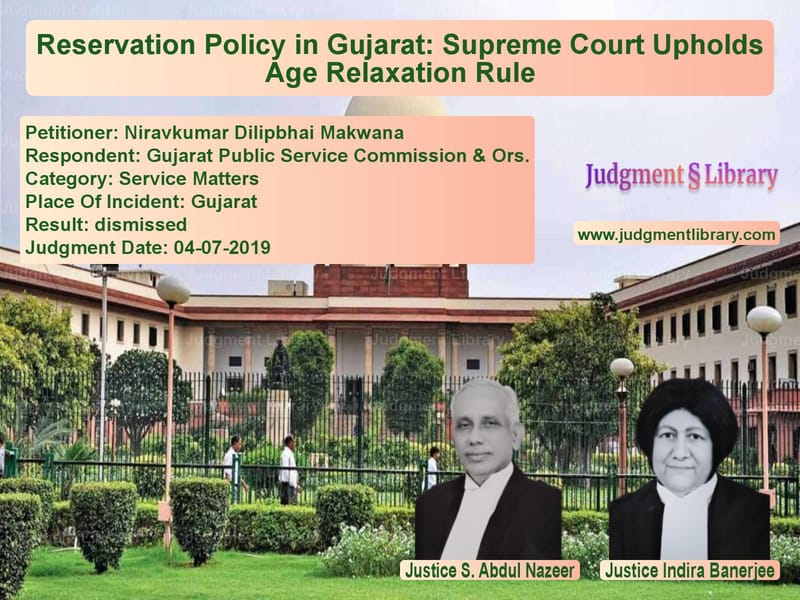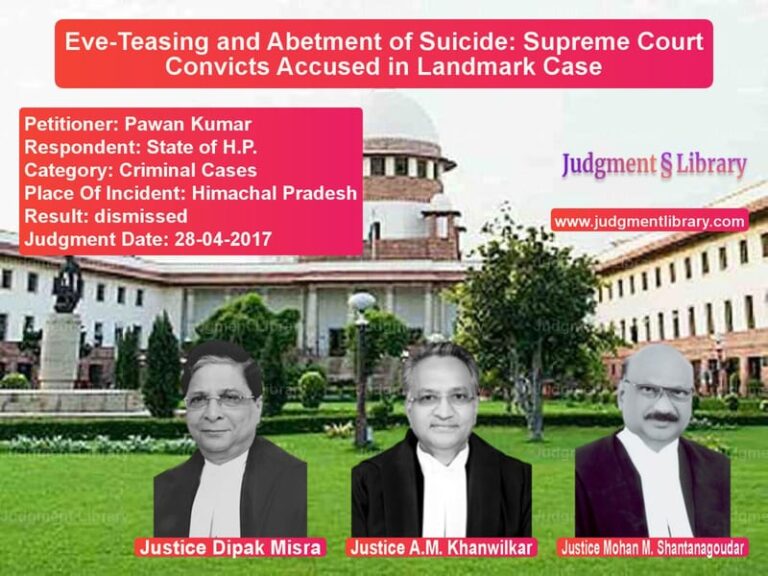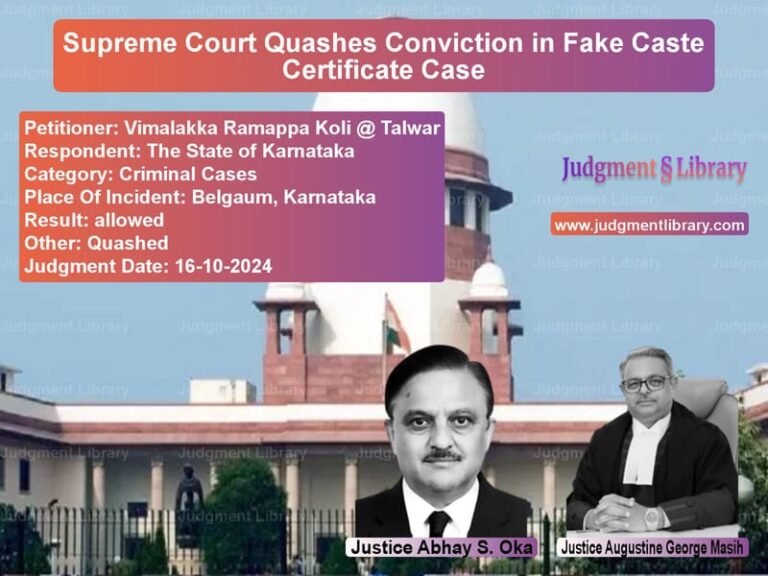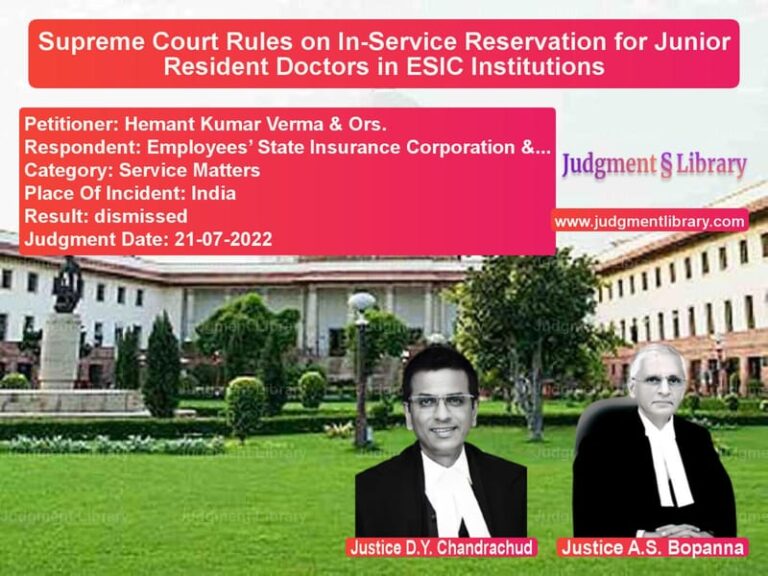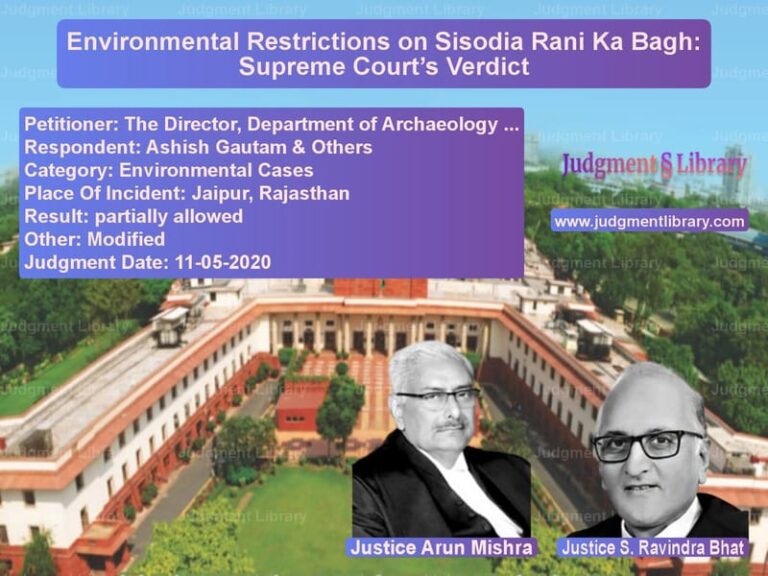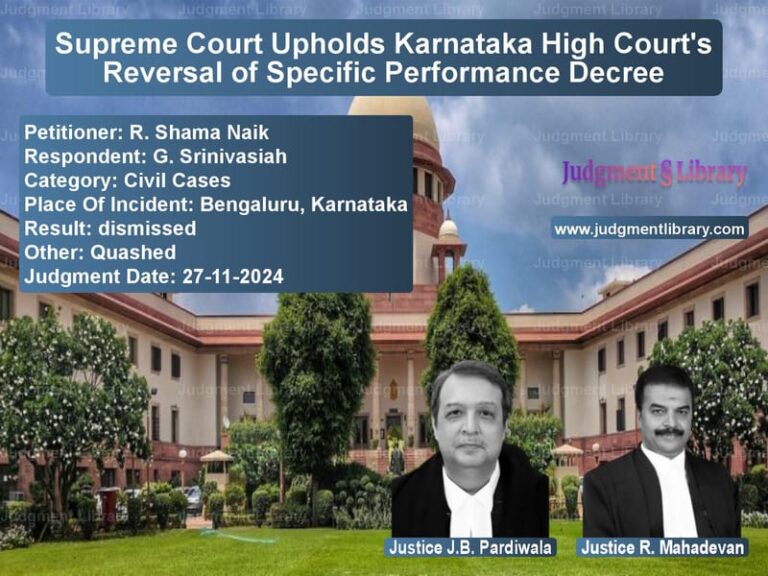Reservation Policy in Gujarat: Supreme Court Upholds Age Relaxation Rule
The case of Niravkumar Dilipbhai Makwana v. Gujarat Public Service Commission & Ors. revolves around the question of whether a candidate who avails age relaxation due to their reserved category status can later claim a seat in the general category. The Supreme Court upheld the Gujarat government’s policy, ruling that candidates who benefit from age relaxation cannot be accommodated in general category seats.
Background of the Case
The case originated from a recruitment process conducted by the Gujarat Public Service Commission (GPSC) for the posts of Assistant Conservator of Forests (ACF) and Range Forest Officer (RFO). The appellant, Niravkumar Dilipbhai Makwana, applied under the Socially and Economically Backward Classes (SEBC) category and availed age relaxation.
Key Facts
- GPSC issued an advertisement on March 1, 2010, inviting applications for 47 ACF and 120 RFO posts.
- Of these, 84 posts were for the general category, while the remaining were reserved for SEBC, Scheduled Castes (SC), and Scheduled Tribes (ST).
- The selection process included a preliminary test (May 30, 2010), a main written examination (May 27 to June 2, 2013), and interviews (June 16 to July 31, 2014).
- The appellant, who had applied as an SEBC candidate, cleared all stages and was placed at serial number 138 in the final merit list published on September 25, 2014.
- Makwana later claimed that he should be considered for an open category seat based on his merit score.
- GPSC denied this request, arguing that he had availed of an age relaxation benefit, which disqualified him from being counted in the general category.
- Makwana challenged this decision in the Gujarat High Court.
Arguments of the Parties
Petitioner’s (Niravkumar Dilipbhai Makwana’s) Argument
- Makwana argued that since he secured a higher score than some general category candidates, he should be considered for a general seat.
- He cited the Supreme Court’s decision in Jitendra Kumar Singh v. State of Uttar Pradesh (2010), which held that merely availing an age relaxation does not disqualify a candidate from the general category.
- He contended that age relaxation should be seen as a concession rather than a reservation, and should not impact his merit-based selection.
Respondent’s (GPSC’s) Argument
- GPSC relied on the Gujarat government’s policy, which states that candidates who benefit from any relaxation (such as age, marks, or attempts) must be placed in their respective reserved category.
- The recruitment rules explicitly mention that age relaxation is a part of the reservation policy under Article 16(4) of the Constitution.
- They also cited previous Supreme Court rulings, including Deepa E.V. v. Union of India (2017) and Gaurav Pradhan v. State of Rajasthan (2018), which held that candidates who use any form of relaxation cannot be placed in the general category.
Supreme Court’s Analysis
Nature of Age Relaxation
The Supreme Court examined whether age relaxation constitutes a mere concession or an incident of reservation. It ruled:
“A candidate who has availed of an age relaxation in the selection process as a result of belonging to a reserved category cannot thereafter seek to be accommodated in the general category seat.”
The Court held that age relaxation is an intrinsic part of the reservation framework under Article 16(4) of the Constitution.
Applicability of the Jitendra Kumar Singh Judgment
Makwana relied on Jitendra Kumar Singh v. State of Uttar Pradesh, which held that age relaxation does not amount to reservation. However, the Supreme Court clarified that this ruling was based on a specific Uttar Pradesh law and did not apply to Gujarat:
“The policy framework in Gujarat is different from that in Uttar Pradesh. The relaxation granted under Gujarat’s government circulars forms part of the reservation system.”
Government Circulars on Reservation
The Court referred to the Gujarat government’s circulars dated January 29, 2000, and July 23, 2004, which specify that candidates who avail any relaxation should be counted in their reserved category.
“Only those SC/ST/SEBC candidates who are selected on the same standards as applied to general candidates shall be counted against unreserved posts.”
The Court found that these policies were consistent with previous judicial precedents.
Final Judgment
The Supreme Court dismissed the appeal and upheld GPSC’s policy:
“There is no merit in this appeal. The appellant’s request to be accommodated in the general category cannot be accepted.”
No costs were awarded.
Significance of the Judgment
- Clarifies Reservation Policies: The ruling confirms that age relaxation is an incident of reservation, preventing candidates from migrating to the general category.
- Maintains Policy Consistency: The decision aligns with previous rulings, ensuring uniformity in recruitment rules.
- Prevents Unfair Advantage: Ensures that candidates do not use reservation benefits selectively to gain undue advantages.
- Strengthens Government Authority: Reinforces the state’s ability to frame policies regarding reservation and relaxation benefits.
Conclusion
The Supreme Court’s decision in Niravkumar Dilipbhai Makwana v. GPSC upholds the Gujarat government’s policy that age relaxation is part of the reservation framework. The ruling ensures that reserved category candidates who avail of relaxation remain within their respective categories, maintaining fairness in recruitment processes.
Petitioner Name: Niravkumar Dilipbhai Makwana.Respondent Name: Gujarat Public Service Commission & Ors..Judgment By: Justice S. Abdul Nazeer, Justice Indira Banerjee.Place Of Incident: Gujarat.Judgment Date: 04-07-2019.
Don’t miss out on the full details! Download the complete judgment in PDF format below and gain valuable insights instantly!
Download Judgment: Niravkumar Dilipbhai vs Gujarat Public Servi Supreme Court of India Judgment Dated 04-07-2019.pdf
Direct Downlaod Judgment: Direct downlaod this Judgment
See all petitions in Recruitment Policies
See all petitions in Public Sector Employees
See all petitions in Judgment by S. Abdul Nazeer
See all petitions in Judgment by Indira Banerjee
See all petitions in dismissed
See all petitions in supreme court of India judgments July 2019
See all petitions in 2019 judgments
See all posts in Service Matters Category
See all allowed petitions in Service Matters Category
See all Dismissed petitions in Service Matters Category
See all partially allowed petitions in Service Matters Category

